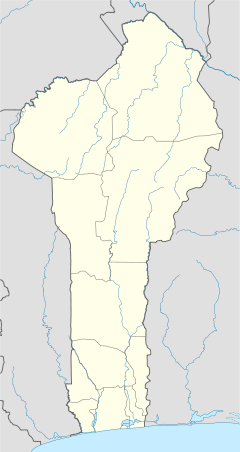Bohicon
| Bohicon | |
|---|---|
| Commune and city | |
|
Road leading into Bohicon from the south
|
|
| Location in Benin | |
| Coordinates: 7°12′N 2°04′E / 7.200°N 2.067°E | |
| Country |
|
| Department | Zou Department |
| Area | |
| • Total | 44 km2 (17 sq mi) |
| Elevation | 167 m (548 ft) |
| Population (2012) | |
| • Total | 149,271 |
| • Density | 3,400/km2 (8,800/sq mi) |
| Time zone | WAT (UTC+1) |
Bohicon is a city in Benin, and a conurbation of Abomey lying 9 kilometres east of the city on the railway line from Cotonou to Parakou and on Benin's main highway RNIE 2 which joins the RNIE 4. The commune covers an area of 139 square kilometres and as of 2002 had a population of 113,091 people.
Bohicon is the crossroads of international trade at the center of Benin. Bohicon is an important in communications in Benin and branches to the various departments of the country, including to the north of Benin and on to Niger or Burkina Faso and even Togo or Nigeria. Bohicon is a relatively new city compared to Abomey and Allada and was founded in the 20th century with the installation of the railway station on the Cotonou–Parakou railway and the central market.
The city has a mosque and the Jehovah's Witnesses also have a church in Bohicon. Bohicon Railway Station is located in the city centre and the main hotel worth mentioning is the Jardin de l'Hotel de Ville De Bohicon which is set in a garden park with a restaurant.
Given the excellent road and rail networks that connect to Bohicon, Bohicon is an important trade centre that is the third largest in the country after Cotonou and Parakou. Trade is the primary activity of the city and its real name "Gboxicon" derives from the extensive sheep marketing that takes places in the city, literally meaning "market sheep".The market is of considerable size and there is a notable drum shop located in Bohicon. The Maquis Malodie market is also known for its cuisine with a number of stalls serving omelette and coffee in the mornings and stacks of pepper and attracts thousands of traders from all over Benin. A speciality sold in the market is afitin (soy dawa-dawa/soy iru), which is traditionally and somewhat famously in Benin made by women in the region. It is a protein-rich fermented food widely used in West Africa as a seasoning.
...
Wikipedia

